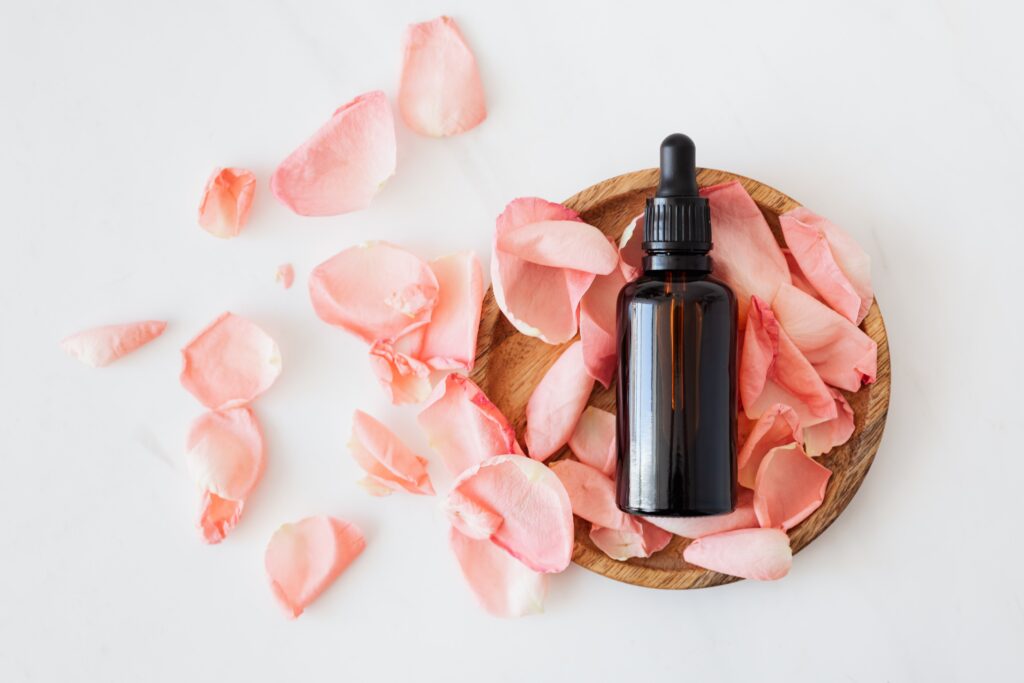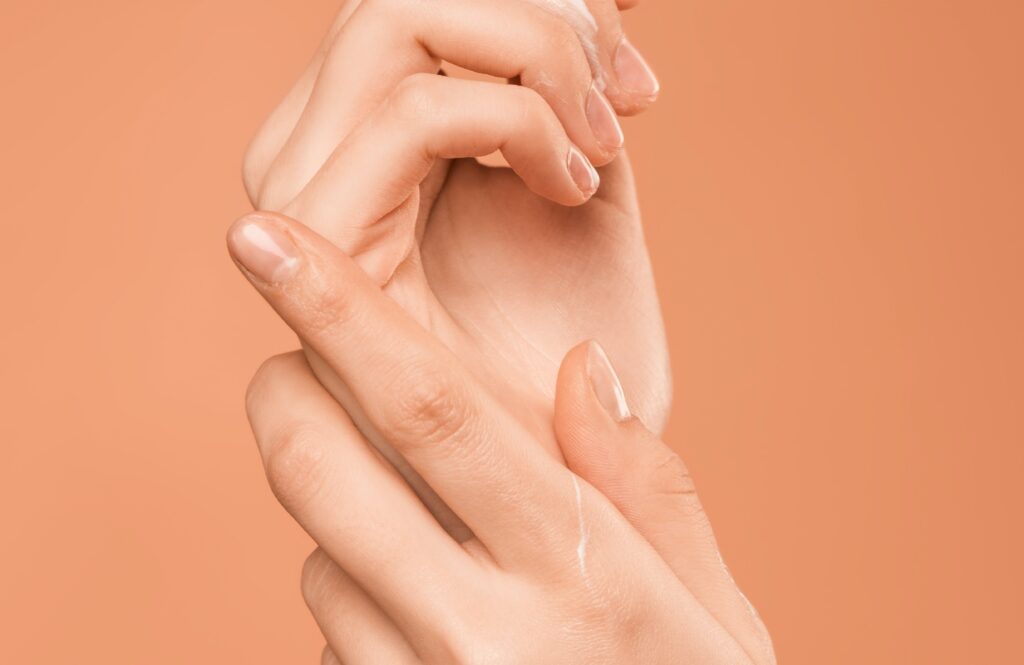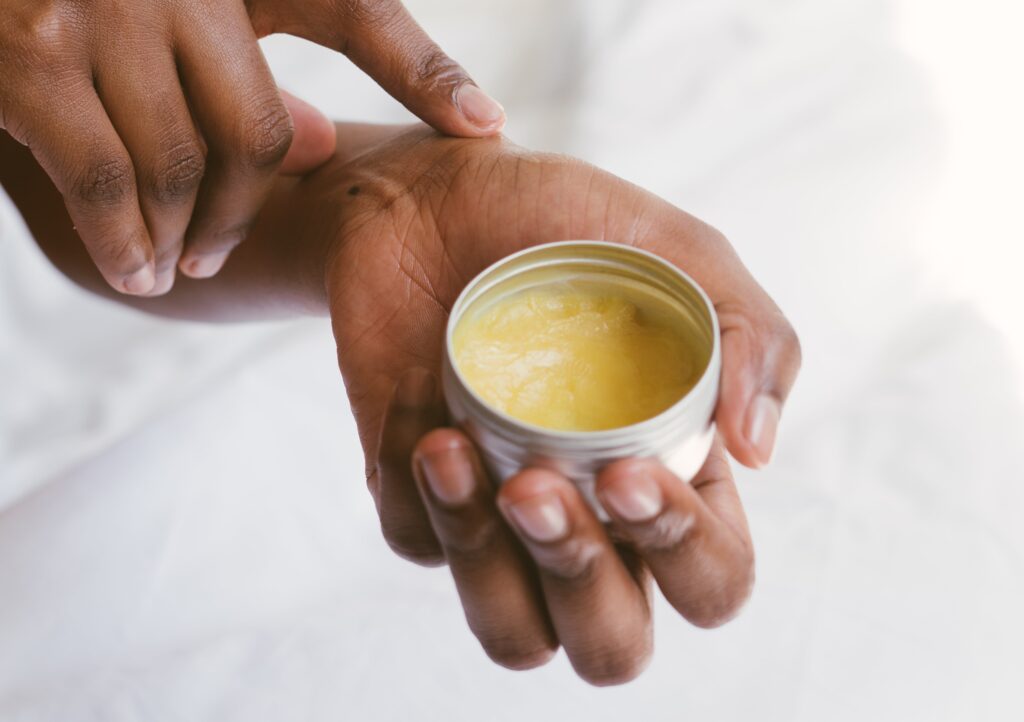Curious about: Is castor oil good for psoriasis? You’re in for a treat. This blog explores the potential of castor oil as a secret weapon against psoriasis, shedding light on its remarkable ability to alleviate the persistent discomfort caused by this skin condition.
We’re about to delve into the details, separating fact from fiction on whether castor oil is a true ally in the battle against psoriasis. No complicated language here—just clear information headed your way. Let’s unravel the mysteries together and find out: Is castor oil good for psoriasis?

Understanding psoriasis and its impact
Let’s break down psoriasis and what it does to you. Imagine your skin going a bit haywire, deciding to speed up its growth cycle. Normal skin cells take their time, but with psoriasis, they’re in a rush – like they’ve got a hot date or something.
This speedy growth leads to a buildup of extra skin cells on the surface. Now, picture those cells as unwanted guests overstaying their welcome at a party. The result? Red, itchy patches that just won’t quit.
But it’s not just about the surface drama. Psoriasis can mess with your joints too, making them stiff and achy. It’s like your body’s throwing a protest, and your joints are leading the march.
Sure, it’s not a life-threatening situation, but it can be downright irritating. Imagine dealing with flaky, itchy skin and creaky joints – not exactly a walk in the park, right?
Now, here’s the kicker – psoriasis isn’t contagious. You can’t catch it like a cold, so no need to avoid your friend with the skin flare-up.
Managing this condition is like finding the right dance moves – it takes some trial and error. Doctors might throw creams, pills, or even injections into the mix. It’s all about figuring out what works best for you and your rebellious skin.
So, next time you hear about psoriasis, don’t picture it as some mysterious, unpronounceable disease. Think of it as your skin decides to go on a growth spurt without giving you a heads-up. Annoying, right? But manageable.
What is castor oil?
Let’s talk about castor oil – it’s not your average cooking oil, that’s for sure. This stuff has been around the block, and people are slapping it on everything from their hair to their toenails. So, what’s the deal with castor oil?
At its core, castor oil is squeezed out of the seeds of the castor plant. Think of it as the plant’s version of olive oil but with its unique vibe. Now, don’t get too excited about drizzling it on your salad – castor oil is more of a behind-the-scenes player.
One of its main gigs is in the beauty department. People swear by this oil for giving their hair a glossy sheen and tackling unruly eyebrows like a superhero. It’s like the secret weapon in the battle against frizz and fuzz.
But castor oil doesn’t stop there – it’s got some skincare game too. Some folks massage it into their skin, claiming it’s the ticket to a smooth and hydrated complexion. It’s like giving your skin a sip of moisture, straight from nature’s hydrating flask.
Now, here’s the quirky part – some folks use castor oil for the inner workings of their body. Yup, they’re talking about drinking it. Before you reach for that bottle, though, know that it’s an acquired taste. Some people find it a bit challenging to gulp down, but hey, if it works for them, who are we to judge?
In a nutshell, castor oil is like the multi-tasker of the natural world. Hair, skin, internal workings – it’s like the Swiss Army knife of oils. Now, let’s tackle a common question: is castor oil good for psoriasis?
The healing properties of castor oil for psoriasis
Ever wondered, “Is castor oil good for psoriasis?” Let’s dive into the healing realm of castor oil and its potential as a remedy for psoriasis.
This isn’t your average kitchen oil – castor oil comes with a reputation for being a bit of a skin savior, especially when it comes to tackling the itch and irritation that psoriasis brings to the table.
The Secret Sauce: Fatty Acids Galore
What sets castor oil apart? It’s loaded with fatty acids, the kind that your skin loves. When you apply this liquid gold to those psoriasis patches, it’s like serving your skin a nutritious meal, calming the storm one drop at a time.

Not One Size Fits All
However, it’s essential to recognize that castor oil isn’t a one-size-fits-all solution. While some hail its miraculous effects on psoriasis, others may not experience the same magic. Finding the right key for a stubborn lock often requires a bit of trial and error.
Simple Yet Potent: Castor Oil’s Natural Approach
Castor oil’s beauty lies in its simplicity. No fancy lab coats or complicated procedures – just good old-fashioned oil from the castor plant doing its thing.
Some swear by the regular application of castor oil onto their psoriasis patches, claiming it brings relief like a gentle breeze on a hot day.
Patch Test Wisdom
Before you start drenching yourself in castor oil, it’s wise to perform a patch test. Just as you wouldn’t jump into a pool without checking the water first, your skin might appreciate a gentle introduction to the soothing touch of castor oil.
Psoriasis Calming Journey
In the quest for calming the psoriasis storm, the question remains: “Is castor oil good for psoriasis?” Try it out, watch your skin’s response, and you might just become a fan of castor oil’s soothing touch in your psoriasis expedition.
How to use castor oil for psoriasis relief
So, you’ve got your hands on some castor oil, and now you’re wondering, “How do I use castor oil for psoriasis relief?” Let’s simplify the process to ensure you maximize the benefits of this natural remedy with straightforward steps.
1. Gather Your Supplies
Before you embark on your psoriasis relief journey with castor oil, make sure you have everything you need. Grab some castor oil, a clean cloth or cotton ball, and maybe an old T-shirt you don’t mind getting a bit oily.
2. Patch Test First
Just like with any new product, it’s wise to perform a patch test. Apply a small amount of castor oil to a discreet area of your skin and wait to see how it reacts. This ensures that your skin won’t throw a surprise party in response to the new treatment.
3. The Application Process
Now, onto the main event – applying castor oil to your psoriasis patches. Take your clean cloth or cotton ball and soak it in castor oil. Gently massage the oil onto the affected areas, ensuring an even application. Think of it as giving your skin a soothing massage.
4. Warm It Up
For an extra touch, you can warm the castor oil slightly before application. This isn’t a hot oil treatment, just a mild warming. It might enhance the absorption and make the whole experience more pleasant for your skin.
5. Leave It On, But Not Forever
Let the castor oil work its magic by leaving it on your skin for a reasonable amount of time. Give it an hour or two, and you might just witness the magic unfold. But hey, if you’re feeling extra committed, you can leave it overnight – just be prepared for a bit of a greasy sensation.
6. Rinse and Repeat
After the designated time, rinse off the castor oil with a gentle cleanser. Pat your skin dry – no need to be rough; your skin has been through enough. Repeat this process regularly, maybe a couple of times a week, and monitor how your skin responds.
7. Consistency is Key
Using castor oil for psoriasis relief is like building a habit. Consistency is key, so don’t be discouraged if you don’t see immediate results. Your skin might need some time to appreciate the castor oil goodness.
Give it a shot, follow these steps, and who knows – you might discover a newfound appreciation for castor oil in your psoriasis relief routine. And, of course, if you ever wonder, “Is castor oil good for psoriasis?” – the answer might just unfold with each soothing application.
Incorporating castor oil into your skincare routine
Ever thought about adding castor oil to your skincare routine? Well, buckle up because we’re about to explore how this simple oil can become your skin’s new best friend.
1. The Castor Oil Selection Process
Before diving in, choose a high-quality, cold-pressed castor oil. It’s like picking the right ingredients for a recipe – you want the good stuff. Look for pure, unadulterated castor oil without any funky additives.
2. The Patch Test Ritual
As with any new addition to your skincare routine, start with a patch test. Your skin might be a bit picky, and we want to avoid any unexpected drama. Apply a small amount of castor oil to a discreet area and wait to see if your skin gives it a thumbs up.
3. The Gentle Cleansing Dance
Kick off your castor oil skincare routine by using it as a cleanser. Take a small amount, massage it onto your face, and let it work its magic. It might sound counterintuitive, but oil can be a great dirt and makeup magnet, leaving your skin feeling clean and fresh.

4. The Hydration Station
Now, let’s talk hydration. After cleansing, you can use castor oil as a moisturizer. Dab a few drops onto your face and massage it in gently. It’s like giving your skin a sip of water without the heavy, greasy feel.
5. The Overnight Elixir
For an extra boost, consider making castor oil a part of your nighttime routine. Apply a slightly larger amount before bed, allowing your skin to soak in the goodness while you catch those Zs. Wake up to a refreshed and hydrated complexion – it’s like a mini spa session while you sleep.
6. The DIY Mask Magic
Feeling a bit crafty? Mix castor oil with other natural ingredients to create a DIY face mask. Honey, aloe vera, or yogurt – the possibilities are endless. This not only nourishes your skin but also adds a fun, DIY element to your skincare routine.
7. The Castor Oil and Chill Routine
Incorporating castor oil into your skincare routine isn’t about a quick fix; it’s about consistency. Use it regularly, observe how your skin responds, and adjust accordingly. It’s like building a relationship – give it time to blossom.
So, there you have it – a guide to incorporating castor oil into your skincare routine. Whether you’re cleansing, moisturizing, or indulging in a DIY mask, let castor oil be the unsung hero in your daily skincare saga. Your skin might just thank you for this simple yet effective addition.
Other natural remedies for psoriasis
Psoriasis can be a stubborn guest, but fear not – nature has some tricks up its sleeve to help you tackle it. Let’s dive into a few natural remedies that might become your allies in this skin battle.
1. Aloe Vera: The Soothing Succulent
Ingredients:
- A fresh aloe vera leaf
Instructions:
- Cut a fresh aloe vera leaf.
- Scoop out the gel from the leaf.
- Apply the gel to the affected areas.
- Leave it on for about 20-30 minutes.
- Rinse with cool water.
2. Apple Cider Vinegar: The Skin-Friendly Tonic
Ingredients:
- 1 part apple cider vinegar
- 1 part water
Instructions:
- Mix equal parts apple cider vinegar and water.
- Dab the mixture onto your psoriasis patches using a cotton ball.
- Leave it on for a few minutes.
- Rinse with water.
3. Dead Sea Salt Soaks: Nature’s Relaxation Prescription
Ingredients:
- Dead Sea salt
Instructions:
- Add Dead Sea salt to warm bathwater.
- Take a relaxing soak for around 15-20 minutes and let the benefits seep in.
- Gently pat your skin dry.
4. Tea Tree Oil: The Potent Extract
Ingredients:
- Tea tree oil
- Carrier oil (such as coconut or jojoba oil as a carrier for maximum effectiveness.)
Instructions:
- Blend tea tree oil with a carrier oil for a potent mix that packs a skincare punch.
- Apply the mixture to the psoriasis patches.
- Leave it on for 15-20 minutes.
- Rinse with water.
5. Turmeric: The Golden Spice
Ingredients:
- Turmeric powder
- Water or honey (optional)
Instructions:
- Blend turmeric powder with water for a simple yet effective paste creation.
- Apply the paste to the affected areas.
- Leave it on for 10-15 minutes.
- Rinse with water. You can also mix turmeric with honey for added benefits.
6. Oatmeal Baths: The Comfort Soaker
Ingredients:
- Colloidal oatmeal
Instructions:
- Add colloidal oatmeal to warm bathwater.
- Soak in the bath for 15-20 minutes.
- Gently pat your skin dry.
7. Coconut Oil: The Tropical Moisturizer
Ingredients:
- Virgin coconut oil
Instructions:
- Apply virgin coconut oil to the psoriasis patches.
- Massage it into the skin.
- Leave it on to allow absorption.
And now, circling back to the question, “Is castor oil good for psoriasis?” – while not mentioned in this list, some individuals find relief by applying castor oil to their psoriasis patches. It’s a natural option worth exploring, but as always, consult with your healthcare provider for personalized advice.
Navigating Risks: Potential Side Effects and Precautions
Castor oil might be a skincare superhero, but like any hero, it comes with its own set of considerations. Let’s unravel the potential side effects and precautions to ensure your castor oil journey is smooth sailing, especially when addressing the question: “Is castor oil good for psoriasis?”
1. Allergic Reactions: The Unwanted Intruders
Before you dive headfirst into the world of castor oil, perform a patch test. Allergic reactions can be sneaky, and we want to rule out any unwelcome surprises. Apply a small amount to a discreet area and wait to see if your skin gives it a green light.
2. Gastrointestinal Distress: The Internal Ripples
While castor oil is a skin favorite, it has a reputation for causing gastrointestinal discomfort if ingested. If you’re considering using castor oil internally, proceed with caution. Consult your healthcare provider to determine the right dosage, if any, for your specific needs.
3. Skin Irritation: The Unwanted Tingle
Despite its skin-loving reputation, castor oil might not be everyone’s cup of tea. Some individuals may experience skin irritation, especially if applied in excessive amounts or left on for extended periods. Moderation is the key – a little goes a long way.
4. Eye Irritation: The Watchful Guardians
Castor oil is fantastic for your skin but can be a bit of a troublemaker if it gets into your eyes. Be cautious during application, and if it happens, rinse your eyes thoroughly with water. Seek medical attention if irritation persists.
5. Pregnancy Concerns: The Consultation Station
If you’re expecting, it’s crucial to consult with your healthcare provider before incorporating castor oil into your routine, especially when pondering the question, “Is castor oil good for psoriasis?” While it’s famed for inducing labor, its safety during pregnancy is still a subject of debate. Better safe than sorry, right?
6. Staining Woes: The Unexpected Marks
Castor oil can be a bit of a rebel when it comes to staining fabrics. That old T-shirt you don’t mind getting oily? Make sure it’s genuinely expendable, or be prepared for some unexpected tie-dye effects.
7. Internal Use Caution: The Dosage Dilemma
If you’re considering ingesting castor oil for its potential internal benefits, determining the right dosage is crucial. Too much can lead to unpleasant gastrointestinal effects, and nobody wants that kind of drama.
Remember, while castor oil has its perks, it’s essential to approach it with mindfulness. If in doubt, consult with your healthcare provider, especially when pondering, “Is castor oil good for psoriasis?” Armed with this knowledge, you can make informed decisions and enjoy the benefits of castor oil with confidence.

Frequently Asked Questions
Q1: Is castor oil good for psoriasis?
A: Some individuals find relief from psoriasis symptoms by using castor oil. It’s known for its moisturizing properties and potential anti-inflammatory effects. However, results may vary, and it’s crucial to perform a patch test and consult with a healthcare professional.
Q2: How do I perform a patch test with castor oil?
A: Apply a small amount of castor oil to a discreet area of your skin and observe for any adverse reactions. This helps you gauge how your skin reacts to the oil before applying it more extensively.
Q3: Can I ingest castor oil for psoriasis relief?
A: While castor oil is known for its internal uses, ingesting it for psoriasis relief should be approached with caution. Consult with a healthcare provider to determine the appropriate dosage and ensure it aligns with your specific health conditions.
Q4: How often should I apply castor oil for psoriasis?
A: Consistency is key. Depending on your skin’s response, you might apply castor oil a few times a week. Monitor how your skin reacts and adjust accordingly.
Q5: How do I remove castor oil stains from clothing?
A: Castor oil can be a bit of a staining troublemaker. Act quickly by blotting the stain with a clean cloth, then wash the fabric with warm water and a mild detergent.
Q6: Does castor oil have a smell?
A: Castor oil typically has a mild, slightly nutty scent. It’s generally not overpowering, making it suitable for various applications.
Q7: Does castor oil stink?
A: While castor oil does have a distinct smell, it’s not typically described as unpleasant or strong. Some may find its natural scent neutral, while others might detect a faint, earthy aroma.
Conclusion: Is Castor Oil Good For Psoriasis
In the grand finale of our castor oil exploration, let’s address the burning question: Is castor oil the secret sauce for psoriasis relief?
After delving into its potential benefits and pitfalls, it’s clear that castor oil has earned its stripes in the skincare arena. Its fatty acids and skin-loving properties make it a go-to for many seeking relief from the itch and irritation of psoriasis.
However, the plot thickens – castor oil isn’t a universal remedy. Some individuals find solace in its application, praising its soothing effects, while others may not experience the same psoriasis-pacifying magic.
The key lies in moderation and understanding your skin’s unique script. Performing a patch test, being mindful of potential side effects, and consulting with your healthcare provider are crucial steps in determining if castor oil is the hero your psoriasis-ridden skin needs.
So, is castor oil good for psoriasis? The answer isn’t a one-size-fits-all declaration. It’s a journey of exploration, where your skin’s response holds the final verdict.
As you embark on your castor oil adventure, armed with knowledge and caution, may your skin find the relief it seeks. Remember, the skincare saga is an ongoing narrative, and castor oil is just one chapter in the quest for psoriasis comfort.